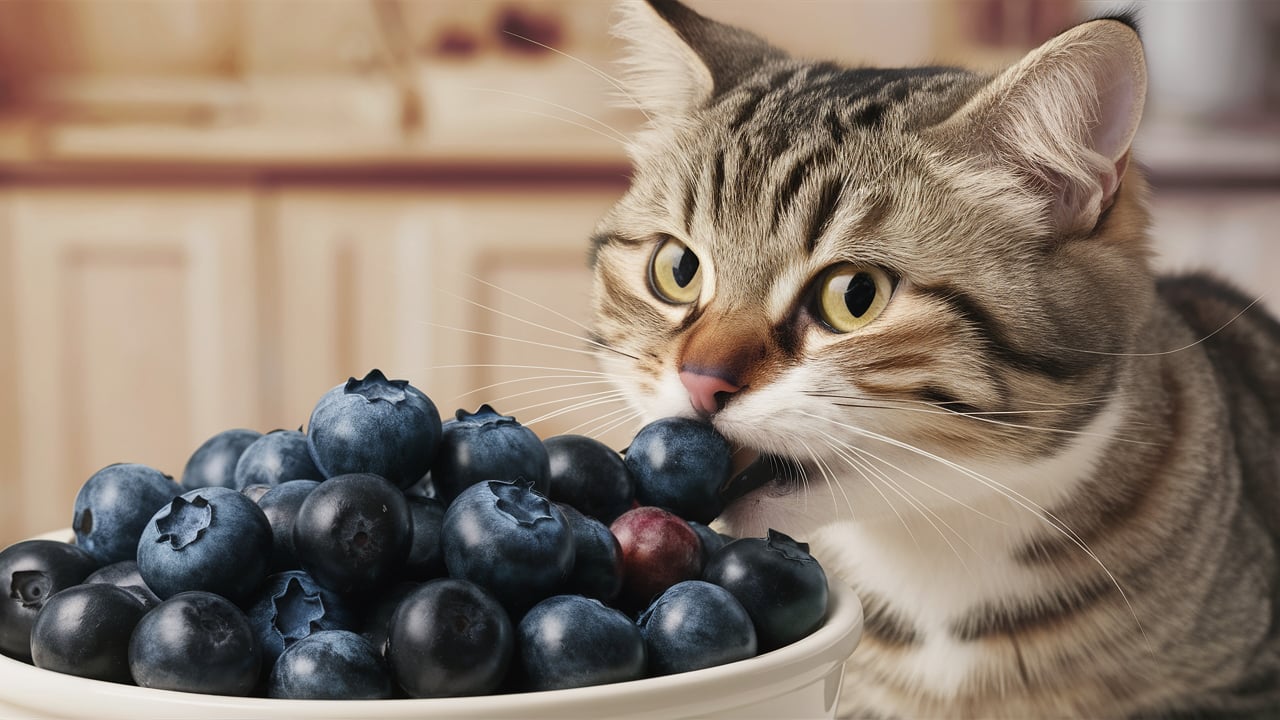Blueberries, with their vibrant color and sweet, juicy flavor, are a popular treat for humans. But what about our feline friends? Can cats eat blueberries? Let’s Cat Safety Tips delve into the world of feline nutrition and explore whether blueberries are a suitable snack for our furry companions.
The nutritional value of blueberries
Blueberries are a nutritional powerhouse, packed with a variety of vitamins, minerals, and antioxidants that contribute to overall health. Here’s a closer look at the nutritional value of these tiny blue gems:
Antioxidants
Blueberries are rich in antioxidants, particularly anthocyanins, which give them their vibrant blue color. Antioxidants help protect cells from damage caused by free radicals, which can contribute to aging and chronic diseases.
Vitamins
Vitamin C: Blueberries are a good source of Vitamin C, an essential nutrient that supports immune function, collagen production, and wound healing.
Vitamin K: They also contain Vitamin K, which plays a crucial role in blood clotting and bone health.
Fiber
Blueberries are a good source of dietary fiber, which aids digestion, promotes regularity, and helps control blood sugar levels.
Minerals
Potassium: Blueberries contain potassium, an essential mineral that helps regulate blood pressure and muscle function.
Manganese: They also provide manganese, a mineral involved in bone formation, metabolism, and antioxidant defense.
Other Beneficial Compounds
Pterostilbene: Blueberries contain pterostilbene, a compound with potential anti-inflammatory and neuroprotective effects.
Flavonoids: They are also rich in flavonoids, which have been linked to improved heart health and cognitive function.
Can cats eat blueberries?
can cats have blueberries? Yes, cats can eat blueberries, but they shouldn’t be a regular part of their diet.
Why blueberries aren’t ideal for cats:
- High Sugar Content: While blueberries are lower in sugar than many fruits, they still contain a significant amount. Cats are obligate carnivores and their bodies are not designed to process large amounts of sugar efficiently. Excess sugar can lead to weight gain, dental problems, and even diabetes in cats.
- Digestive Issues: Blueberries are high in fiber, which can cause digestive upset in some cats, leading to diarrhea or vomiting.
- Seeds and Stems: The seeds and stems of blueberries can be a choking hazard for cats. It’s best to remove them before offering blueberries.
- Pesticide Residue: Always choose organic blueberries or wash them thoroughly to minimize the risk of pesticide exposure.

Are blueberries safe for cats?
While blueberries are not a staple food for cats, they are generally considered safe for them in small amounts. Blueberries are not inherently toxic to cats, meaning they won’t cause immediate harm or death if ingested.
However, it’s important to remember that cats are obligate carnivores, meaning their bodies are primarily designed to digest meat-based proteins. This means that fruits like blueberries should be considered occasional treats rather than a regular part of their diet.
One potential benefit of blueberries for cats is their low calorie content. This can be helpful for overweight cats, as it allows for a small, flavorful treat without adding significant calories to their daily intake.
How to feed blueberries to cats?
While blueberries are not a staple food for cats, if you decide to offer them as an occasional treat, here’s how to do it safely:
Start small
Introduce blueberries gradually, starting with just a few berries. This allows you to monitor your cat’s reaction and see if they have any adverse effects.
Remove seeds and stems
Before offering blueberries, carefully remove the seeds and stems. These can be a choking hazard for cats.
Choose organic or wash thoroughly
Opt for organic blueberries to minimize the risk of pesticide residue. If organic blueberries are not available, wash them thoroughly under running water to remove any potential contaminants.
Offer as a treat, not a meal
Blueberries should be offered as an occasional treat, not a regular part of your cat’s diet. A balanced diet of high-quality cat food should be the primary source of nutrition.
Monitor for reactions
Watch your cat carefully for any signs of digestive upset after eating blueberries. This might include vomiting, diarrhea, or lethargy. If you notice any adverse reactions, discontinue feeding blueberries and consult your veterinarian.
Consider your cat’s individual needs
Some cats may be more sensitive to certain foods than others. If your cat has a history of digestive issues or allergies, it’s best to avoid feeding them blueberries.
Consult your veterinarian
Always consult with your veterinarian before introducing any new foods to your cat’s diet. They can provide personalized advice based on your cat’s individual needs and health history.
In conclusion
Can cats eat blueberries? While blueberries are not toxic to cats, they are not a necessary part of their diet. A balanced diet of high-quality cat food should provide all the nutrients your feline friend needs. If you choose to offer blueberries, do so in moderation and with caution, starting with small amounts and monitoring for any adverse reactions.

Related Post
Does Cat Know When You Are Sad? Do Cats Love Their Owners?
Why Does My Cat Bite Me? Deciphering Feline Communication
Can Cats Eat Strawberries? Good For Cats?